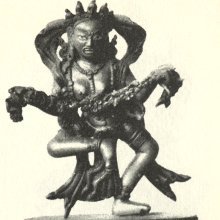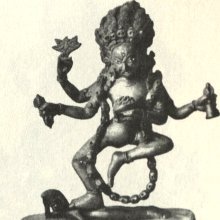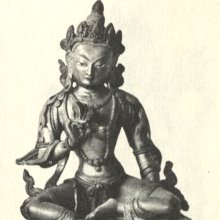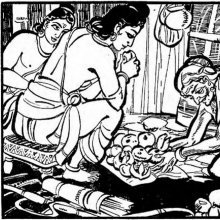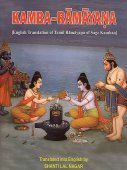Shabari, Śābarī, Śabarī: 11 definitions
Introduction:
Shabari means something in Buddhism, Pali, Hinduism, Sanskrit, Marathi, Jainism, Prakrit, Hindi. If you want to know the exact meaning, history, etymology or English translation of this term then check out the descriptions on this page. Add your comment or reference to a book if you want to contribute to this summary article.
The Sanskrit terms Śābarī and Śabarī can be transliterated into English as Sabari or Shabari, using the IAST transliteration scheme (?).
Images (photo gallery)
In Hinduism
Purana and Itihasa (epic history)
Source: archive.org: Puranic EncyclopediaŚabarī (शबरी).—A woman of the tribe of forest-dwellers. Śrī Rāma, during his life in the forest, gave her salvation. Former life. Śabarī, in her former life, was the only daughter Mālinī of the Gandharva King, Citrakavaca. An erudite scholar, Vītihotra, married her. As he was ever immersed in contemplation of Brahman his wife Mālinī, (later Śabarī) kept one hunter, Kalmāṣa, as her paramour, and her husband cursed her thus: "As you have become a lover of the hunter, you turn out to be a hunter-woman." (See full article at Story of Śabarī from the Puranic encyclopaedia by Vettam Mani)

The Purana (पुराण, purāṇas) refers to Sanskrit literature preserving ancient India’s vast cultural history, including historical legends, religious ceremonies, various arts and sciences. The eighteen mahapuranas total over 400,000 shlokas (metrical couplets) and date to at least several centuries BCE.
In Buddhism
Tibetan Buddhism (Vajrayana or tantric Buddhism)
Source: archive.org: The Indian Buddhist IconographyŚabarī (शबरी) refers one of the eight Gaurīs, commonly depicted in Buddhist Iconography, and mentioned in the 11th-century Niṣpannayogāvalī of Mahāpaṇḍita Abhayākara.—Her Colour is white; her Symbol is Meru; she has two arms.—The sixth goddess in the Gaurī group is Śabarī.
Śabarī is described in the Niṣpannayogāvalī (pañcaḍāka-maṇḍala) as follows:—
Source: academia.edu: The Structure and Meanings of the Heruka Maṇḍala“Śabarī is white in colour and holds in her right hand the Meru mountain”.
[The left exhibits the common gesture, the tarjanī.
All the deities are violent in character with fearful appearance and ornaments, and garlands of heads. They dance in pratyālīḍha and show the raised index finger with clasped fist against the chest, as the common gesture.]
Śabarī (शबरी) is also mentioned as the Ḍākinī of the south-western corner in the Jñānacakra, according to the 10th century Ḍākārṇava chapter 15. Accordingly, the jñānacakra refers to one of the three divisions of the saṃbhoga-puṭa (‘enjoyment layer’), situated in the Herukamaṇḍala. Two colors are evenly assigned to the four corner Ḍākinīs [viz., Śabarī] in order in accordance with the direction which they face.

Tibetan Buddhism includes schools such as Nyingma, Kadampa, Kagyu and Gelug. Their primary canon of literature is divided in two broad categories: The Kangyur, which consists of Buddha’s words, and the Tengyur, which includes commentaries from various sources. Esotericism and tantra techniques (vajrayāna) are collected indepently.
Languages of India and abroad
Marathi-English dictionary
Source: DDSA: The Molesworth Marathi and English Dictionaryśābarī (शाबरी).—a (śābara q. v. or śabarī A name of Devi or Parvati under the form of the wife of a śabara A barbarian of the mountainous district of India.) Relating to magic or sorcery. Used with mantra, vidyā, anuṣṭhāna, tantra &c.
--- OR ---
sābarī (साबरी).—a (Properly śābarī) Magical. Used with mantra-vidyā-anuṣṭhāna-tantra &c.
Marathi is an Indo-European language having over 70 million native speakers people in (predominantly) Maharashtra India. Marathi, like many other Indo-Aryan languages, evolved from early forms of Prakrit, which itself is a subset of Sanskrit, one of the most ancient languages of the world.
Sanskrit dictionary
Source: Cologne Digital Sanskrit Dictionaries: Edgerton Buddhist Hybrid Sanskrit DictionaryŚabarī (शबरी).—name of a yoginī: Sādhanamālā 443.16.
Source: Cologne Digital Sanskrit Dictionaries: Monier-Williams Sanskrit-English Dictionary1) Śabarī (शबरी):—[from śabara] f. a Śabara woman, [Rāmāyaṇa; Kathāsaritsāgara] etc.
2) Śābarī (शाबरी):—[from śābara] f. the dialect of the Śabaras, [Sāhitya-darpaṇa; Mṛcchakaṭikā, [Introduction]]
3) [v.s. ...] Carpopogon Pruriens, [cf. Lexicographers, esp. such as amarasiṃha, halāyudha, hemacandra, etc.]
4) Śābari (शाबरि):—[from śābara] m. Name of a man, [Buddhist literature]
Source: DDSA: Paia-sadda-mahannavo; a comprehensive Prakrit Hindi dictionary (S)Śabarī (शबरी) in the Sanskrit language is related to the Prakrit word: Sabarī.
[Sanskrit to German]
Sanskrit, also spelled संस्कृतम् (saṃskṛtam), is an ancient language of India commonly seen as the grandmother of the Indo-European language family (even English!). Closely allied with Prakrit and Pali, Sanskrit is more exhaustive in both grammar and terms and has the most extensive collection of literature in the world, greatly surpassing its sister-languages Greek and Latin.
Hindi dictionary
Source: DDSA: A practical Hindi-English dictionarySabarī (सबरी):—(nf) (a house-breaker’s) jemmy (used for breaking through a wall).
...
Prakrit-English dictionary
Source: DDSA: Paia-sadda-mahannavo; a comprehensive Prakrit Hindi dictionarySabarī (सबरी) in the Prakrit language is related to the Sanskrit word: Śabarī.
Prakrit is an ancient language closely associated with both Pali and Sanskrit. Jain literature is often composed in this language or sub-dialects, such as the Agamas and their commentaries which are written in Ardhamagadhi and Maharashtri Prakrit. The earliest extant texts can be dated to as early as the 4th century BCE although core portions might be older.
Kannada-English dictionary
Source: Alar: Kannada-English corpusŚabari (ಶಬರಿ):—[noun] a ಶಬರ [shabara] woman.
--- OR ---
Śābari (ಶಾಬರಿ):—[noun] a woman belonging hunterś caste.
--- OR ---
Sabari (ಸಬರಿ):—[noun] (correctly, ಶಬರಿ [shabari]) a woman belonging to ಶಬರ [shabara] caste.
Kannada is a Dravidian language (as opposed to the Indo-European language family) mainly spoken in the southwestern region of India.
See also (Relevant definitions)
Starts with: Shabaribhu, Shabarika, Shabarimala, Shabaripada.
Ends with: Keshabari, Parnashabari.
Full-text: Sabari Nivadunga, Parnashabari, Shapari, Kshiravriksha, Shabaribhu, Capari, Vitihotra, Caturdevi, Cavari, Konavasi, Malini, Karkandhu, Shabarimala, Shramana, Matanga, Vibhasha, Apabhramsha.
Relevant text
Search found 22 books and stories containing Shabari, Śābarī, Sabari, Sābarī, Śabarī, Śābari, Sabarī, Śabari; (plurals include: Shabaris, Śābarīs, Sabaris, Sābarīs, Śabarīs, Śābaris, Sabarīs, Śabaris). You can also click to the full overview containing English textual excerpts. Below are direct links for the most relevant articles:
Hanuman Nataka (critical study) (by Nurima Yeasmin)
11. Use of Prākṛta < [Chapter 4]
Atithi or Guest Reception (study) (by Sarika. P.)
Part 1 - Treatment of Atithi (guest-reception) in Rāmāyaṇa < [Chapter 3 - Atithi-saparyā in Epics and Purāṇas]
Chapter 12 - Observations and Conclusions
Puranic encyclopaedia (by Vettam Mani)
'Sabari': A Spiritual Romance < [July-August 1933]
Viswanatha Satyanarayana's Srimadramayanakalpavriksham: Aranyakanda < [April - June 1977]
Dewdrop < [July 1955]
The Skanda Purana (by G. V. Tagare)
Chapter 56 - Fruit of Dāna Described < [Section 3 - Revā-khaṇḍa]
Chapter 17 - Efficacy of the Holy Ash (Concluded) < [Section 3 - Brāhmottara-khaṇḍa]
Chapter 17 - Dialogue between Nārada and Jalandhara < [Section 4 - Kārttikamāsa-māhātmya]
Ramayana of Valmiki (by Hari Prasad Shastri)
Chapter 74 - Rama visits Shabari < [Book 3 - Aranya-kanda]
Chapter 75 - Rama reaches the Lake Pampa < [Book 3 - Aranya-kanda]
Chapter 73 - Kabandha’s Counsel to Rama < [Book 3 - Aranya-kanda]
Related products
